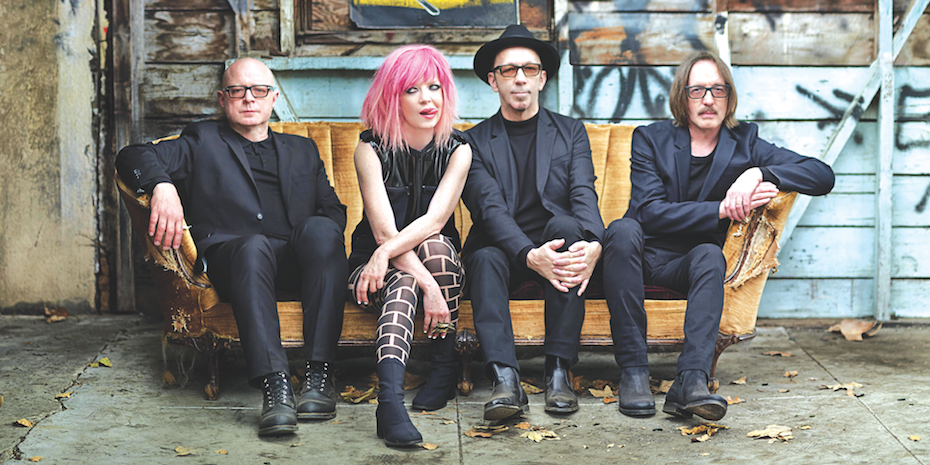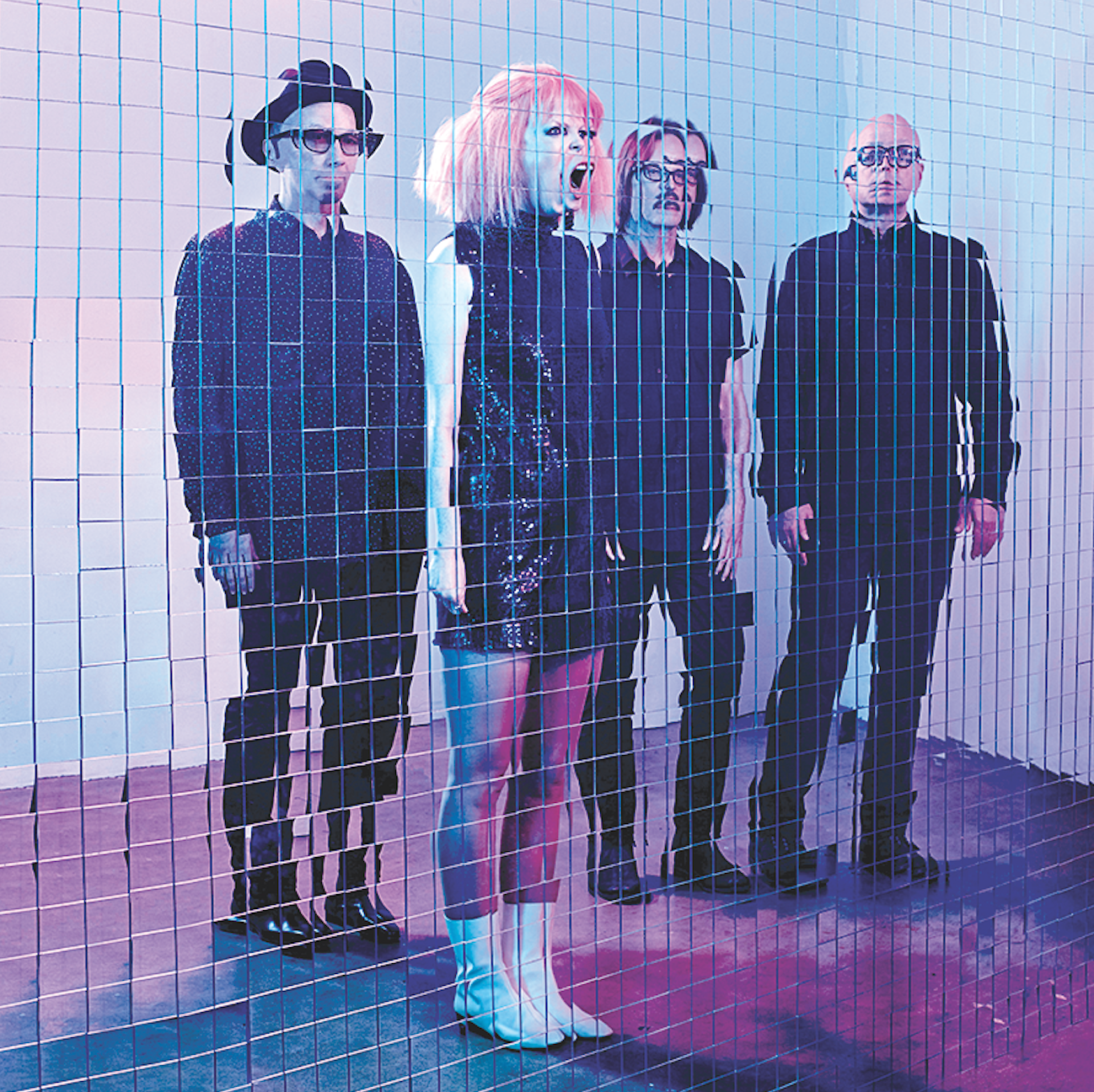Garbage


When Garbage first formed in 1993, the alternative rock scene was coming into its own. Although there was a distinct “sound” associated with that time — think Nirvana, Soundgarden, Sonic Youth — Garbage cemented its place in the pop music annals by taking a counter approach to music-making. The result has been a career spanning more than 23 years, with a brief hiatus around 2006, and records that grow progressively more creative and genre-defying with each release.
The quartet of singer Shirley Manson, bassist Duke Erikson, guitarist Steve Marker and drummer Butch Vig joined Mushroom Records UK in 1995 for the eponymous debut, kicking off a run of three successful studio albums under the label before the group moved to Interscope in 2001. Prior to Garbage, Vig had honed his production chops on a number of projects, including cultural touchstone Nevermind, along with several records from The Smashing Pumpkins and Sonic Youth, among others. When the group reconvened in 2007 after its 18-month hiatus, it brought with it a reinvigorated creative approach, carrying that momentum over into several lauded studio albums and a record label, Stunvolume, which produced a number of Record Store Day releases featuring Garbage collaborations and covers.
Strange Little Birds, which debuted in early June, is the sixth studio album from Garbage, and its darker tones and focus on isolated vocals from Manson more than adequately quenched the thirst of fans eagerly awaiting new material following 2012’s Not Your Kind of People. Strange Little Birds is a nuanced, affecting work that highlights the group’s continued successful creative collaboration. Each member of the group shares both creative and production credit on the album — as they have with each Garbage release — and the instrumental interplay here is perhaps as fresh as any effort from the group over the course of its career.
Manson’s vocals are as distinct and powerful as ever, and the attention to detail throughout is noticeable. The precision of the instrumental layering and balanced push and pull on each track leaves Strange Little Birds as a wholly successful addition to the group’s impressive discography.
As Garbage sets out on its record-supporting tour, stopping at Roseland Theatre on Sept. 18, we spoke with drummer Vig about the group’s sonic evolution, the creative process, changes in the music industry and the benefits of starting an independent record label.

* * *
Eleven: The first thing I noticed on the electronic version that I got of your guys’ new album is that you were listed as the main composer there, and I was wondering if that reflected the compositional and production role in this album?
BV: You know, all four of us share production decisions, and a lot of it was done by home studio, the initial recording sessions, and it was really loose, really low-key, because I just had, like, a bedroom with a small a small drum kit, and … there’s no soundproofing or whatever, it’s not really a proper studio. But that’s where we recorded the bulk of Strange Little Birds. I think that you, as a producer, really speak for atmosphere, but I’m just one of the four members that makes production decisions. You know, we all butt heads every single day in the studio. I think that’s one of the reasons that we sound the way we do.
Eleven: I know you guys have had a lot of varying sounds over the years, which is really interesting. And this one’s coming out on your guys’ personal label, right, Stunvolume?
BV: Yes.
Eleven: So what’s that been like? There’s been a diversification in the music industry. It’s a lot easier now for people to start up their own labels and find new bands and put music out there. Was that a conscious decision to be able to kind of explore some other bands and some other sounds by having your own label, or was that more of a business decision?
BV: Well, the great thing about having our own label is that we’re able to pick and choose exactly what we wanna do. You know, we don’t answer to anyone now. And we had a lot of success with major labels, you know, our first couple albums came out and the music business started changing and it just didn’t make any sense for us to be signed to a major label anymore. And now, just with the digital revolution and the internet, there’s so many things available at your fingertips, not just for Garbage but for any band that allows you to really do it yourself, and so it just made sense for us to do that, like, it’s best that we could take total control over what we do and we wouldn’t have to answer to anyone but ourselves.
Eleven: And is that one of the biggest differences that you’ve seen, in general, in the music industry from when you guys came on in the early ’90s to today, basically?
BV: Well, everything has changed. It’s hard to just name one change, but part of it’s, like, radio changes in terms of what they play and what their audience is and what they think…what radio stations think their audiences want to hear. Obviously, the way people consume music; they want music more than ever. It’s everywhere, it’s the soundtrack of your life, but nobody wants to pay for it, so everybody’s had to figure out how to, you know, use their business model to make a living doing what they do. And so, you know, with all that great freedom there’s also changes in the way everybody operates, not just the labels but the bands. You know, you can’t really make money selling your music anymore, so you have to figure out other ways, whether you can supplement that with going on tour, and everyone’s still trying to struggle with how they’re gonna make the it work.
Eleven: Garbage is kind of an interesting case because it seems like you’re pretty open with your fans when you’re working on new music and some of the ideas that you’re putting out there. Is that something that you guys decided to do, or is that just kind of the nature of the beast – the 24-hour connected, social media world of today?
BV: You know, really, a lot of that falls on Shirley’s shoulders, and she’s OK with it. She’s always been very outspoken and very opinionated, and I think she likes having direct communication with our fans. The other guys will rarely publish or tweet anything, and I don’t really very often either. I’ll go on Facebook and see what’s going on with our friends, but I don’t post that many things, and we’re lucky that Shirley does that, that she engages in it, and I think that, to a certain extent, she likes doing that.
Eleven: It’s interesting, just from a fan perspective, having some of that insight into the creative process, especially for a long-running group like Garbage. So, what I’m wondering, I know that you do a lot of production outside of Garbage work, and I’m wondering, if, over the years, that has changed way that you create music now with your band? Do you do it with more of a producer’s ear, or is it kind of more granular for you?
BV: Well, it depends, really. When I’m working with the Foo Fighters, it’s my job to remember that it’s their vision and I’m just there to help facilitate it. In Garbage, I’m a songwriter, I’m a producer, I’m an engineer and I’m a drummer. I’m a guitar player. I wear a lot of different hats, play in multiple worlds, and just that depends on any given day where those responsibilities fall and what happens. I think all four of us like being a band where we can share those responsibilities. But there is a democracy, and that’s why we’re still here. All four of us have found a great working environment being in Garbage.
Eleven: So, for Strange Little Birds, you mentioned that it was mostly done in a home studio and it was a little bit looser. At a high level, when I was listening to it, it seemed like it had a little bit more of, kind of, an industrial tone to it. Is that something that you guys had made a decision to do or was it more the after-product of some of the song writing sessions, and that was just the overall tone. Is that accurate, would you say?
BV: I wouldn’t really say industrial, but I would say more, sort of, atmospheric and cinematic, because a lot of textures on there represent less rock ‘n’ roll. You know, there’s a couple songs, they have a lot of really long guitars, but a lot of the times we took those out and a lot more on symphonic moments and keyboards and sound effects in the atmospheric space. I mean, some of the songs are these big, wide-open moments where it’s just Shirley’s voice … and it just made sense to arrange the songs that way because it’s in her lyrics, you know. She really wrote some dark lyrics. Strange Little Birds is our darkest album that we recorded, and we needed to make the music fit what Shirley was singing.

Eleven: I was looking back at the whole list of different acts that Sub Pop Records has had over the years, and I know you had done some early work with artists on that label. Do you think that that’s kind of an interesting scenario where you have a record company that, you know, caters to more unique acts that has stuck around for so long, especially when you’ve seen other ones come and go so often?
BV: Well, Sub Pop is truly a special label. I mean, they’ve followed their own drums for over 20 years, and they’re amazing. The guys who run it, Bruce Pavitt and Jonathan Poneman, were visionary, but they followed their vision, and to still be around after so long is incredible. And I think it shows you what you can do when you rely on your audience’s kinks. You know, they never pandered to try and sell. They didn’t want to sell a pop artist, and sell 10 million records. They just weren’t interested in that. When they started Sub Pop, they signed bands that they liked … the best labels have always been that way.
Eleven: And is that kind of a similar ethos to what you guys are pursuing with Stunvolume?
BV: Well, so far Stunvolume has only released Garbage records, and we released a handful of record store hit singles that we’ve collaborated with other artists. We’ve talked about signing some other bands but, honestly, we just do not have any time. We’re so busy with the recording or touring; it seems like we’re just going full bore, all the time. So it’s something we may do something but, as I said, right now, Stunvolume is pretty much just a Garbage label.
Eleven: Before I let you go, are there any music acts out there that you’re particularly excited about these days.
BV: Oh god, there’s a ton of bands that I listen to. It’s hard for me to say … whenever someone asks me that I have to look at my phone. But I’m driving right now. I can’t pick it up. I’m just trying to think. I love Typhoon, they’re one of my favorite new bands. I just love the tracks on their last couple albums. I love the new Beach House record which has been out for a while. I found some band the other day — I think they’re called The Struts — but I thought they were badass. The singer is totally, like, channeling early rock influences like Freddie Mercury from Queen.»
– Charles Trowbridge



